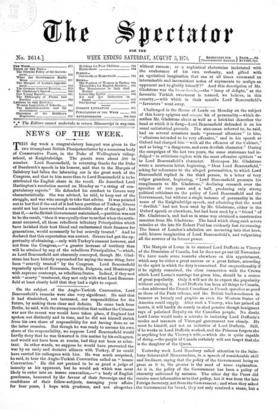On the subject of the Anglo-Turkish Convention, Lord Beaconsfield's remarks
were also very significant. He said that it had diminished, not increased, our responsibilities for the future, by making them clear and definite. He came back from Berlin, he said, with the strong conviction that neither the Crimean war nor the recent war would have taken place, if England had spoken out distinctly and in time, and he did not himself shrink from his own share of responsibility for not having done so on the latter occasion. But though he was ready to assume his own share of the responsibility, we suppose Lord Beaconsfield would hardly deny that he was thwarted in this matter by his colleagues, and would not have been so remiss, had they not been so reluc- tant. In other words, we suppose he would have prevented the war by an early and decisive alliance with Turkey, if' he could have carried his colleagues with him. He was much surprised, he said, to hear the Anglo-Turkish Convention called an "insane Convention." He did not pretend to be as good a judge of insanity as his opponent, but he would ask which was most likely to enter into an insane convention,—" a body of English gentlemen, honoured by the favour of their Sovereign and the confidence of their fellow-subjects, managing your affairs for four years, I hope with prudence, and not altogether
without success ; or a sophistical rhetorician inebriated with the exuberance of his own verbosity, and gifted with an egotistical imagination that can at all times command an interminable and inconsistent series of arguments to malign an opponent and to glorify himself ?" And this description of Mr. Gladstone was the bonne-bouche,—the "lump of delight," as the favourite Turkish sweetmeat is termed, we believe, in this country,—with which in their mouths Lord Beaconsfield's " favourers " went away.






























